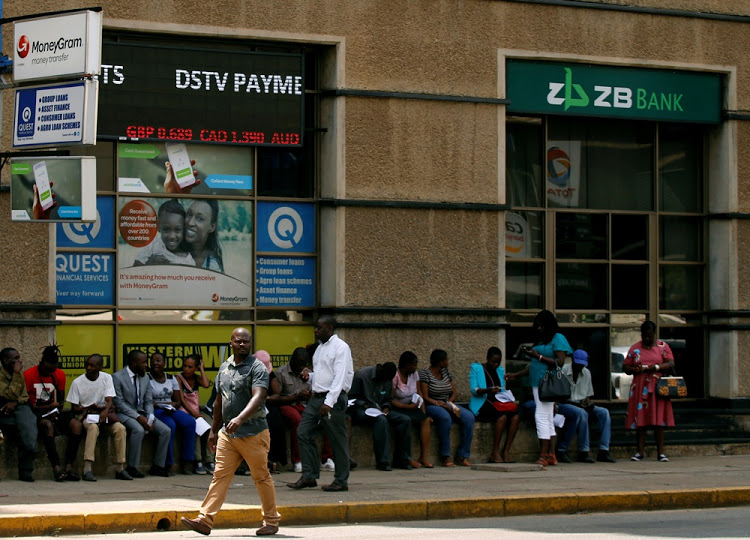Public sector workers in Zimbabwe demonstrated in the capital city of Harare yesterday evening, demanding that their salaries be reviewed to compensate for the loss of their real incomes since October last year. After the demonstration, they submitted a petition to the finance minister, the labor minister and the office of public service.
In October 2018, the government introduced payment in RTGS, which is a quasi-currency of bond notes and electronic money pegged to USD that was at a 1:1 ratio initially. But since then, it has lost its value sharply.
The lowest paid public sector worker was earning the equivalent of USD 475 a month in RTGS in October last year. After a steady decline in the value of RTGS vis-a-vis dollars over the months that followed, it has now dropped to a mere USD 47.
“Civil servants are not asking for a salary increment but rather restoration of their earnings” to the October levels, read the petition submitted by the leadership of the Apex Council, which brings together 16 public sector unions. The petition also indicated that a strike action is not ruled out if the government fails to pay heed to their demands.
Since the introduction of payment of salaries in this currency, the prices of commodities in RTGS, including that of the essential ones such as bread and medicines, have been increasing with every fall in the value of RTGS vis-a-vis USD.
At the beginning of this year, many retailers, including pharmacists, started to refuse to accept payments that were not in USD due to fears of a loss in value of any other payment from one day to another.
Despite the evident decline in its value in the black market, the government maintained that the official exchange rate was at 1:1 ratio until February. The government has since discarded this ratio after it became impossible to maintain the pretense and introduced the foreign currency interbank market to determine the exchange rate.
In this market, RTGS 2.5 exchanged for USD 1 at the time, implying that the workers had already lost the value of their earnings by over 50%. With the steady decline since February, as of yesterday, USD 1 sold at the price of almost RTGS 9 in the interbank market, and at 10 in the black market.
Although workers had undertaken a number of agitations demanding payment of their wages in USD, the government outlawed the use of USD and made RTGS the only legal tender in the last week of June. However, USD continues to circulate in the black market and remains the currency to which the prices, even that of basic commodities, have been adjusting.
In an apparent attempt to thwart the threatened “mass action” by the unions, the government offered to increase the total money allocated for payment of civil servants’ salaries by RTGS 180 million, which equaled USD 21 million. This amount, shared between 309,000 workers, would have amounted to an average increase of USD 11.28 per worker per month. The Apex Council rejected this offer.
In another round of meetings yesterday, the government offered to hike only this month’s salary by 50%. Following this, from August onward, the lowest paid workers would have received a pay-hike of RTGS equivalent to USD 13.20, over the USD 47 equivalent they are currently being paid.
The council rejected this offer as well, which is far from offsetting the loss of earning from USD 475 to USD 47. Apex Council secretary David Dzatsunga said, “As of now, we are still negotiating, but there will come a point where if we realize that we are not getting anywhere, we will declare a deadlock.. In the event that the government fails to come with an acceptable offer, we are going to do whatever is within our labor rights to force the hand of government to give what is due to the workers.”
While Dzatsunga’s statement implies that they are not ruling out a strike action, the risks involved in it are considerable. A legislation signed in the first week of July bans unions from undertaking strike action before exhausting all other avenues.
In the same month, the Independent reported that the police, not the military, had acquired “3,343 AK-47 rifles, 2,000 CZ pistols, 500 P1 pistols… 500 Mossbergs, 500 riot guns, 300 mortar tubes, 500 MAG, 300 SSG sniper rifles, 300 Dragunov, 100 RPG, 1,500 Tokarev and 22,948 AK magazines”.
These acquisitions have not been made by the defense ministry but by the interior ministry, which has deemed the ammunition as “critical requirements” for maintaining law and order. Well over a thousand police officers have been given paramilitary training.
Multiple reports indicate that these are a part of preparations made by the Zimbabwean government to deal with the labor unrest that is becoming increasingly inevitable.





